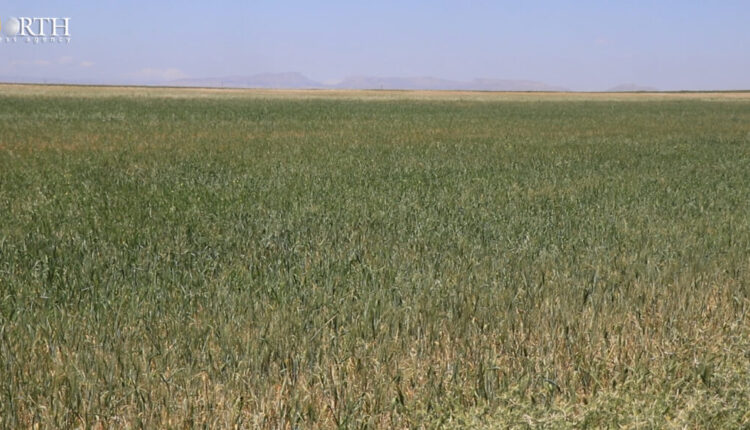
QAMISHLI, Syria (North Press) – The wheat and barley harvest season is about to begin in the Jazira region (Hasakah Governorate), northeast Syria. But Abdul-Aziz Derbo, a local farmer, is afraid of working on his land near the Turkish border in the countryside of Amuda town, west of the city of Qamishli. Days ago, he was shot at by Turkish border guards.
On May 3, the 49-year-old Derbo was injured as he returned from his land, riding his motorcycle with his nephew, north of Amuda.
Despite his recovery, Derbo is afraid of returning to his land as he fears being targeted again. Since agriculture is the family’s only source of income, his brother is taking care of their wheat crop, exposing himself to the Turkish border guards.
“I was with my nephew on a motorcycle when they targeted us with three bullets; I was injured in the back. We stayed on the ground for ten minutes, because they were shooting directly at us after that they fired five shots at us,” Derbo told North Press.
Derbo is not the only one suffering from violations by Turkish border guards. Many owners of agricultural projects that are located near the border cannot check on them. “They could target us at any moment, we all are afraid of being targeted by Turkish forces,” they tell North Press.
The farmer calls on the concerned international forces to stop these violations, “we are civilian not military personnel, agriculture is our only source of income, harvest season will start soon.”
Farmers who live near the Turkish border in areas held by the Autonomous Administration of North and East Syria (AANES) live in a constant state of fear as the harvest season approaches.
On April 27, Turkey targeted the outskirt of the village of Tops, in the countryside of Amuda, with tow shells. On May 8, the Turkish border guard fired live bullets at a passing civilian car in the village of Kharazah, west of Amuda. No casualties were reported.
Cannot reach our lands
Farmers in northeast Syria are optimistic about a bountiful harvest this year due to prevalence of heavy rainfall, after two years of drought. It could revive the region’s economy.
A few kilometers west of Amuda, Abdul-Aziz Hassan, accompanied by a number of other relatives, is in a race against time to maintain his harvest on his land near the border.
“We are living near border and we have agricultural projects close to this place. We are preparing our harvesters here; Turkey is targeting us from time to time,” Hassan told North Press.
“Some time ago, one of the farmers was injured. We hope that these violations will stop before the harvest. The harvest season will start soon, we are afraid of being targeted, we do not have the courage to do our work,” he added.
Wheat is the most important food crop although its production is subject to great fluctuations in rainfall. In Northeast Syria, specifically, which is the primary agricultural region in the country, the population is highly reliant on agriculture for their livelihoods and consumption.
Turkish border guards target us
In the city of Qamishli, a group of women are working in a farmland adjacent to the Turkish border, defying all risks in order to make a living.
Abdullah Bakerish, owner of wheat field near the Syrian-Turkish border, told North Press that Turkish border guards do not allow the workers onto his land most of the time.
“We can’t work all the day because they start shooting at us after 2 pm. They prevent my workers from doing their job, the wheat needs to be watered to grow properly, and they told them that it is forbidden,” Bakerish added.
“They throw stones at us. When they talk to us we do not understand them; we try to make them understand that we are only farming,” Bakerish noted.
These attacks affect the farmers on the border lands, as well as the workers. “A few days ago, the tractor was working on the land. They were asking the driver to back off, but because of the noise he did not hear, so they shot him.”
Since the beginning of the Syrian war, more than 500 Syrians have been killed by Turkish border guards or their assaults, according to the Violations Documentation Center in Syria. They have targeted children, farmers, and ordinary people in front of their houses or while working in farmland adjacent to the border. The Monitoring and Documentation Department of North Press recorded the death of over 40 individuals, including children and farmers, on Syrian territories by Turkish border guards since 2011.
“The daily laborers we bring to work on the land are now avoiding work because their lives are in danger. We are afraid of moving while doing our work in our lands. What shall we do? This is our main source of living,” he concluded.
